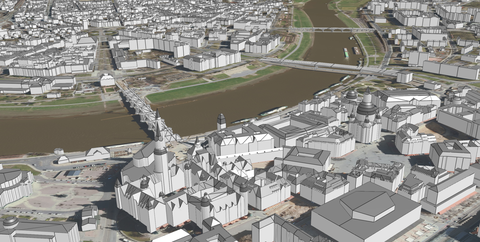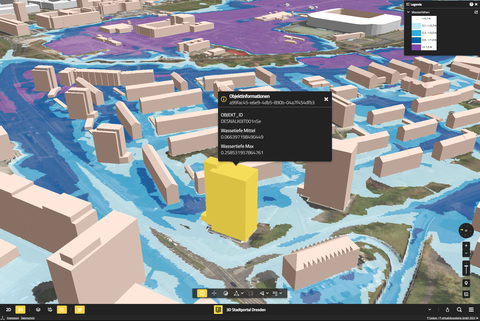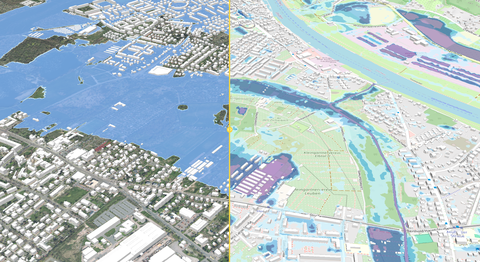23.09.2024
Smarte Lösung für Hochwasserschutz: Forscher:innen der TU Dresden entwickeln eine App für die Simulation von Starkregenereignissen

Geobasiszwilling der Landeshauptstadt Dresden
Extremwetterereignisse, wie sie im Zuge des Klimawandels inzwischen regelmäßig auftreten, stellen Städte und Kommunen vor große Herausforderungen. In Dresden entwickelt das Institut für Wasserbau und Technische Hydromechanik (IWD) einen „Urbanen Digitalen Starkregenzwilling“ für die sächsische Landeshauptstadt. Mittels App können Nutzer:innen künftig Starkregenereignisse simulieren, Informationen über Gefährdungslagen erhalten und auf dieser Grundlage Schutzmaßnahmen vorbereiten. Der Prototyp auf Basis freier und offener Software liegt nun vor.
Im Rahmen des Modellprojekts Smart City Dresden arbeiten Forscher:innen am IWD seit Mai 2024 an der technologisch-methodischen Erstellung des sogenannten Starkregenzwillings: ein virtuelles Modell der Stadt, in dem geografische Daten (die Topografie Dresdens) und städtische Informationen (etwa Straßen- und Gebäudetypen) zusammengeführt werden. Nach Integration von Fachinformationen aus der Hydrologie und Hydrodynamik können im digitalen Zwilling Abflusssimulationen durchgeführt werden, die der Landeshauptstadt Dresden eine doppelte Nutzung ermöglichen.
„Ziel des Projekts ist es, ein leistungsfähiges System zu schaffen, das sowohl als Frühwarnsystem für Starkregenereignisse sowie auch als Planungsinstrument zur Anpassung an den Klimawandel genutzt werden kann“, erklärt Entwickler Lars Backhaus.

Wasserstandsabfrage an einem Gebäude bei einem Extrem-Starkregenereignis
Der Prototyp bietet eine vollautomatisierte Erstellung von 2D-Simulationsmodellen, die durch Niederschlagsprognosen des Deutschen Wetterdienstes ergänzt werden können. Die Simulationsergebnisse liefern detaillierte Informationen zu Wassertiefen und Fließgeschwindigkeiten in überfluteten Gebieten und können mit städtischen Infrastrukturelementen wie Straßen und Gebäuden verschnitten werden, um potenzielle Gefährdungen genau zu analysieren.
Über eine für Desktop- sowie Mobilgeräte verfügbare 3D-Web-App können grundlegende Karten- und Flächendaten visualisiert und abgerufen werden. Anwender:innen erhalten die Möglichkeit, Starkregensimulationen in manuell ausgewählten Stadtbereichen zu starten und die Ergebnisse in Echtzeit zu verfolgen. Dabei lässt sich das Hochwasserrisiko für den gesamten Stadtbereich bis hin zum einzelnen Gebäude bewerten um schlussendlich Betroffenheits- und Schadenspotentiale zu berechnen. Diese können die zuständigen Behörden und Privatpersonen bei der Entscheidungsfindung der Hochwasservorsorge unterstützen.

Vergleich betroffener Gebiete Elbe-Hochwasser HQ100 (links) und Extrem-Starkregenereignis (rechts)
Eine besondere Fähigkeit des Systems, so Backhaus, sei es, dass man die Simulationsmodelle schnell und einfach auf Basis des im Urbanen Digitalen Zwilling verknüpften kommunalen und landesweiten Datenbestand generieren könne. So ließen sich sowohl klassische 2D hydrodynamisch-numerische Simulationen für Stadtgebiete als auch daraus abgeleitete 3D-Simulationen von Bauwerken wie Brücken erstellen. Dies erlaubt es der Stadt, präzise Daten zur Überflutungsgefährdung zu erhalten und so im Katastrophenfall schneller reagieren zu können.
Im 2. Quartal 2025 soll die Plattform öffentlich zugänglich gemacht werden. Die vollständige Entwicklung des Urbanen Digitalen Starkregenzwillings ist für Ende 2026 vorgesehen. Eine Weiterentwicklung darüber hinaus wird angestrebt.
Über das Modellprojekt Smart City Dresden und die Maßnahme „Umweltmonitoring/Digitaler Starkregenzwilling
Im dem von der Bundesregierung geförderten „Modellprojekt Smart City Dresden“ (2022-2026) werden innovative Maßnahmen in Modellstadtteilen Dresdens getestet, um die Stadt nachhaltig, gemeinwohlorientiert und lebenswert zu gestalten.
Die Projektleitung der Landeshauptstadt (Eigenbetrieb IT-Dienstleistungen) arbeitet an mehreren Stellen mit der TU Dresden zusammen. So ist das WISSENSARCHITEKTUR – Laboratory of Knowledge Architecture für die wissenschaftliche Leitung zuständig. Ein Forschungsteam der Wirtschaftsinformatik untersucht die Wertgenerierung des städtischen Open-Data-Portals. Die Maßnahme „Umweltmonitoring/Digitaler Starkregenzwilling“ entsteht unter Leitung des Umweltamtes der Landeshauptstadt Dresden (Dr. Katja Maerker) und setzt das BMU-Förderprojekt WAWUR (Wild abfließendes Wasser in urbanen Räumen) fort.
Kontakt
Lars Backhaus M.Sc. (Medieninformatik)
Institut für Wasserbau und Technische Hydromechanik (IWD)
Tel: +49 351 463-32262
E-Mail:
